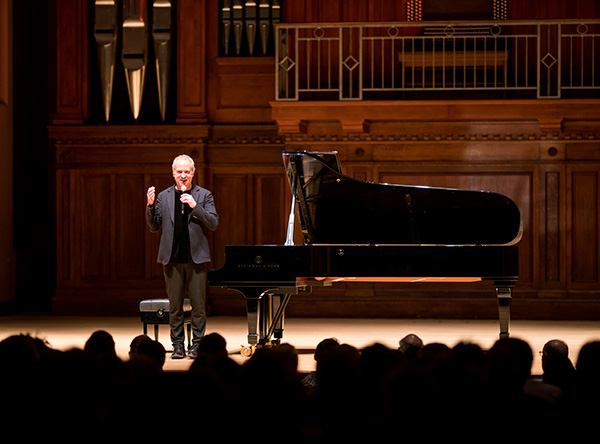by Daniel Hathaway

The second half featured a pair of 19th-century works by Robert Schumann and Johannes Brahms, composers with close personal connections to Clara Schumann, whose Romanze, Op. 21, No. 1 launched the whole evening.
Denk’s mental wheels are constantly in motion. A program insert reflected his most recent thinking about the order and pairing of pieces in the first half, and his opening remarks to the audience completely changed the works to be featured in the second. He then treated his listeners to a 35-minute, continuous setlist of pieces in a variety of styles, performed with the brainy, insightful, and effortless playing for which Denk is famous, and impressive for his ability to discover the essence of each brief work and to move so quickly and decisively from one to the next.

Cécile Chaminade’s salon piece The Flatterer was followed by Missy Mazzoli’s suspenseful and funereal-sounding Heartbreaker, a natural pairing as Denk pointed up in his colorful interpretations.

Phyllis Chen, another Oberlin grad — who is best known for her toy piano works — was represented by her Sumitones, an improvisatory, colorful piece expressed in graphic notation that comes to a tragic ending. Catharsis followed in the form of “Dreaming,” another Amy Beach work from her Four Sketches that is gorgeously and harmonically true to its early 20th century era, and that Denk played with both affection and conviction.

He ended his program with expressive accounts of Brahms’ Op. 119 Four Pieces, explaining beforehand that these very late works, especially the first — which he played with a lingering sense of nostalgia — found Brahms bidding adieu to established norms of western tonality.
This very personally chosen program could have made a listener feel as though they were eavesdropping on a private conversation between pianist and piano, but Denk’s intention was obviously to share music widely that he deeply cared about. He ended the evening by responding to the long, warm ovation with a lovely Scott Joplin rag.
Photos by Abe Frato.
Published on ClevelandClassical.com December 7, 2023.
Click here for a printable copy of this article


